Current & Alumni Fellows
Contact
Kofi Annan Institute for Global Citizenship (IGC)Markim Hall, Third Floor 651-696-6655
651-696-6750 (fax)
igc@macalester.edu
facebook twitter
Class of 2025
Antara Bhattacharyay

Major: Music
Project: Resistance through Music in West Bengal’s Dalit Community
For thousands of years, the caste system has had a stranglehold on Indian society. Excluded from the four main castes, the Dalit are positioned at the bottom of the social hierarchy. In West Bengal, India, while individuals perpetuate the myth of the state’s supposed “casteless” society, Dalits continue to face caste-based exclusion. Amidst nationwide Dalit activism and growing literary efforts in the 1960s, the Bangla Dalit Literary Movement (BDLM) soon followed, producing literary and musical works that persist today. In this project, I observe the role of folk music in urban West Bengal’s Dalit resistance, specifically through the examination of songs written by Smritikana Howlader (b. 1960). Howlader is a prominent Bengali Dalit singer-songwriter and political activist affiliated with the efforts of BDLM. Through the analysis of Howlader’s work, I investigate how Bengali folk music—a genre traditionally found in Dalit and lower caste communities—facilitates the communication of Dalit empowerment. I posit that Bengali folk music embodies a resistive medium, permitting the reappropriation of rural stylistic and thematic elements in an urban setting oriented towards contemporary issues, including an anti-caste agenda. Additionally, I explore how Howlader’s songs foster unity and a broader Indian identity, evoking the shared humanity between castes. Ultimately, I argue that the musical and performative aspects of Howlader’s art serve to combat dominant caste ideologies and Dalit erasure, furthering the resistance efforts of Bengali Dalits.
Leo Corral, Sociology
Karla Garcia, American Studies
Huihui Jiang

Major: Religious Studies
Project: True Sounds, True Words: On the Use of Transliteration in the Translation of Chinese Buddhist Texts
The translation of scriptural texts is a crucial part of the transmission of a religion. The introduction and translation of Buddhist scriptures into Chinese is not only an important factor in the spread of Buddhism in East Asia, but also a significant cultural project that has permanently transformed the religious and linguistic landscape of China. Although interpretation of meaning is the primary strategy for the translation of Buddhist classics from Sanskrit or other Central Asian languages into Chinese, there is a considerable amount of transliteration, i.e., the transference of phonetic sounds, appearing in Chinese Buddhist scriptures. This paper attempts to answer the questions of when and why translators resort to transliteration versus translation of Buddhist scriptures into Chinese. What are the advantages of transliteration compared to translation? To answer these questions, this paper examines mantra and dharani, two types of Buddhist language that are generally transliterated instead of translated. After reviewing the history of translation of Buddhist scriptures into Chinese, translation strategies employed by past translators, and scholarship on religious language, this paper argues that transliteration preserves the authenticity and sacrality of mantras and dharanis, while allowing for repeated exposures to the religious benefits associated with them.
Louise Yang

Major: Sociology
Project: Decolonization in Practice: Disrupting Whiteness in the Classroom at a Liberal Arts College
Decolonization is becoming more commonly employed by self-proclaimed progressive universities to demonstrate their commitment to diversity and inclusion while the institutions continually fail to extend themselves to anything beyond performative action. Decolonization is a theory that involves unlearning white supremacy and/or internalized racism, critiquing the settler relationship to land, encouraging critical thinking, engaging with community organizations and issues, and developing reciprocal relationships in education. These values are antithetical to the settler colonial and white supremacist foundations of universities in America which continue to dominate classrooms through traditions in academia such as hidden curriculum and the four-year university cycle. Predicated on the central position of whiteness in the university system, these devices facilitate the legacies of exclusion of Black, Indigenous, People of Color (BIPOC) from the classroom. I am investigating how remnants of foundational structures of the university allow for the reproduction of whiteness in academia and how they are being challenged by the application of decolonial practices and frameworks in the classroom. In order to examine the efficacy of current applications of decolonization in a liberal arts classroom setting, I am employing lenses of decolonization, critical whiteness studies, and critical university studies to conduct an ethnography of a course that claims to center decolonization. When universities intend to use decolonization to reject their oppressive foundations, how can they be held accountable to not co-opt this term and exploit what is supposed to be a transformative framework? How do we, as actors in the university, avoid sabotaging our own decolonial ideals in practice? This project will consider how teaching can be conducted in a decolonial way to dismantle the university, as a means to rewrite and confront the oppressive system of whiteness in higher education.
Class of 2024
Francesca Bernardino

Major: Sociology
Project: “Eating the Other”: Food as a Tool of Multiculturalism in Institutions of Higher Education
While numerous sociological studies on culinary cosmopolitanism exist, studies focusing on how students engage with cosmopolitanism are scant. Even fewer studies investigate the role of food in the performance of multiculturalism at colleges and universities. However, college is a prime site for socialization, and with more colleges and universities branding themselves as diverse and multicultural, the performance of these values, however superficial, can be increasingly observed in various elements of campus life, even food consumption. Through textual analysis of official college materials concerning diversity, inclusion, and multiculturalism, in-depth interviews with juniors and seniors of Macalester College, as well as participant observation of various identity-based organization events happening on campus at which food is served, I ask two central questions. First: How does Macalester College attempt to socialize its students through cosmopolitan food practices on campus in order to produce “global citizens?” Second: How do students receive and respond to these strategies in their own behaviors and actions concerning restaurant-going and food consumption, both on and off campus? This project aims to bridge interdisciplinary literature on whiteness, culinary cosmopolitanism, and multiculturalism at colleges and universities to investigate how everyday practices can be invested in whiteness and reproduced through the seemingly benevolent actions of institutions of higher education.
Gabriel Gonzalez

Major: Classics
Project: Fables as Smoking Mirrors: Nahuatl Translations of Aesop at the Franciscan College of Santa Cruz at Tlatelolco
Against the backdrop of colonialism, how did indigenous students subvert and re-interpret their Spanish education? In what contexts did language and translation become indigenous students’ greatest weapon? In two surviving manuscripts from the Franciscan College of Santa Cruz at Tlatelolco, forty-seven of Aesop’s classic fables are rendered in Nahuatl, translated from Latin. Presented without context, only the initial phrase on both manuscripts suggests their intended
purpose: to “teach us to live an orderly life.” Recent scholarship agrees: on the eve of the Renaissance Humanist movement in Europe, Aesop’s Fables were often taught, read, and translated to impart wisdom and morals. Specifically, they functioned like “mirrors for princes,” a European genre pitched to educated elites to reflect their world’s social order. For Franciscans teaching the indigenous elites at Tlatelolco, these “mirrors” were an easy way to present the Spanish colonial hierarchy as natural, and the eventual responsibility of the indigenous students to uphold as the new, multilingual governing class. However, none have yet addressed how these fables might have been interpreted by Nahua students steeped in pre-Conquest religion as well as Christianity. How was Aesop’s secular wisdom subverted when the metaphysical and naturalistic properties of Nahua religion were folded into new translations? Did student translations of fables transform European “mirrors of princes” into Nahua “smoking mirrors”?
Arushi Nair

Major: German Studies
Project: “Reconstructing German Studies: Roma & Sinti Experience and Expression”
How can we spotlight the Roma and Sinti second generation in the German-speaking world, and highlight their voices? When the Roma are discussed or invited to speak, it is typically limited to their experience with the atrocities of World War Two and the Holocaust. Seldom is it about their culture and their own history. By shifting to focus on the art, poetry and literature of the Roma, I am hoping to elevate the voices within the second generation, all those born in an era disconnected from the war. There is so much more to this group than the discrimination and pain they have faced. And although the injustices of past and present have indeed been formative in the lives of so many Roma & Sinti, to focus on that alone reduces the scope of what we know and can learn from them. As part of my research project, I will analyze and discuss a memoir and a selection from an anthology of poems. Dotschy Reinhardt, a Sinti musician and author, has used her voice in many ways to speak about her identity and represent her culture beyond the scope of the war. In her book she explores the distinctions between Sinti and Roma, her ambitions, and her connection to generations of Roma artists. She tells a new story, a different story that puts into question everything scholarship claims to know about the Roma and the Sinti.
Neisy Rodriguez

Major: Sociology, Spanish
Project: Child-rearing in the Context of Illegality
Sociologists have established that intersections such as race, ethnicity, gender, social class, and sexuality all operate to produce unique challenges for families and affect child-rearing practices. Most scholarship on children in mixed-status families has focused on social class without fully addressing the impact of legal status. My research focuses on the question: “To what extent does illegality shape child-rearing practices in mixed-status families?” I hypothesize that illegality greatly affects how mixed-status families raise children. Unauthorized parents live in a different social context than their authorized counterparts because they are excluded from fully integrating into American society and are targeted by xenophobic immigration laws and policies; this affects their conversations with their children. I am completing a qualitative study that focuses on analyzing social processes in mixed-status families. In summer of 2023, I conducted nine in- depth interviews with Mexican parents in the Chicago area. Parents in these interviews were asked questions about their experience with illegality and parenting. One of the questions asked was “In what ways do you think “illegality”/immigration status has impacted your life or the lives of your family?” I have created a coding schema to analyze all interviews to determine if any accommodations made by the participants to their child-rearing practices based on their legal status. The coding schema looks at varying categories and themes including messages, practices, and resources. Preliminary analysis of sections of some interviews suggests that illegality does deeply impact child-rearing practices.
Jack Keller

Major: Chinese
Project: Beauty and Battle: Translating Chinese Migrant Worker Poetry
As China has moved into the twenty-first century with rapid industrialization, Chinese migrant workers caught in the global economic engine have turned to poetry to voice their isolating lifestyle, hellish working conditions and lack of recognition and representation. In this research presentation, I discuss my translations of migrant workers’ poetry. I have aimed to translate the “battler” language and beautiful imagery in their poems. The hardships endured by these workers and the adversity they face is described as battle-like, as they fight for survival at the bottom of society. Their writing contains aggressive and violent wording, and it is rich with cultural and historical references. At the same time, these untrained poets depict vibrant and animated imagery, writing elegiac, beautiful lines. In my translations, I convey these themes and highlight the voices of this marginalized population, as well as the injustices they continue to face. Continuing my research in the fall, I have concentrated on translating the works of three male migrant worker poets, 许立志 Xu Lizhi, 陈年喜 Chen Nianxi and 许多 Xu Duo. The emergence and development of migrant worker poetry offers us an important opportunity to explore the feelings, beliefs and values of a marginalized and subjugated group in the context of a rapidly changing and increasingly global China.
-
Class of 2023 Muriel Ambrus (Graduated December 2022)
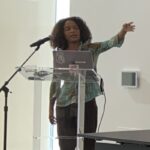
Major: American Studies
Project: “Contextualizing Resistance in Minneapolis Post George Floyd: How Do Race and Class Inform How We See Violence?”
How do race, class and neighborhood affiliation shape Minneapolis residents’ perceptions of the events that took place after George Floyd’s murder? Growing up in the Twin Cities, I have long been interested in state-sanctioned violence against marginalized communities and the general public’s acceptance of this violence that maintains the status quo and quells resistance. My project centers on the aftermath and repercussions of the 2020 uprising in Minneapolis. My work has included analyzing neighborhood demographics in comparison to voter data, interviewing Minneapolis residents from different race and class backgrounds about their position on police abolition, an extensive bibliography on police, looting and riots, and writing on abolition and inequality in the Twin Cities. Under the lens of American Studies, I seek to examine how race and class influence everyday perceptions of what constitutes violence. In the wake of a massive uprising against police abuse in Minneapolis, why were more residents seemingly outraged by property destruction than by the violence and governmental negligence that plagues the lives of Black working class residents in Minneapolis? Scholars Vicky Osterweil and Samuel L. Meyers Jr. are crucial to my work. Osterweil demonstrates how Black communities might retaliate against the state through wealth redistribution, property destruction, and rioting. In turn, Meyers Jr. exposes what he has coined the Minnesota Paradox, the intense disparities reinforced systematically that give white Minnesotans better outcomes in employment, housing, jobs, education and health care. In the wake of sustained insistence on nonviolent demonstrations only, why is there no outrage for violence on an institutional level and how can we move beyond framing racism solely as interpersonal actions?AJ Papakee
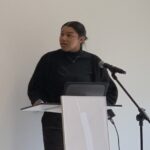
Major: American Studies
Project: “Indigenous Revitalization and Environmental Justice: Lower Phalen Creek Project in Practice and Context”
What does land revitalization and resurgence look like for Indigenous communities and how does this provide a vision for the future of our communities? I answer this question by closely considering how the Lower Phalen Creek Project, a local Dakota-led environmental project based in St. Paul, MN, recognizes land deprival and models Indigenous revitalization. As an intern at Lower Phalen Creek Project, I am assisting with compiling a comprehensive tour guide of the history of the Wakan Tipi/Bruce Vento Sanctuary. This site was a sacred meeting and ceremonial space for Dakota and other midwest tribes, which was first destroyed upon settler contact and Dakota removal. It has been a decades-long project to restore and recreate this space through renaming and re-storying the site’s history. Lower Phalen’s present goals as an organization are Urban Conservation and Restoration, Environmental Justice, and Cultural Connections and Healing. I hope to bridge my personal experience with Lower Phalen Creek Project alongside my Indigenous and Black environmental justice perspectives, particularly focusing on the parallel histories and present-day realities of Indigenous and Black dispossession. I am building on the works of both historians Dr. Kyle T. Mays’s An Afro-Indigenous History of the United States and updating Indigenous scholar Jim Rock’s historicization of Wakan Tipi to discuss how we think about place, memory, and land connections and belonging. I examine where Black and Indigenous perspectives converge and how this convergence transforms community activism and relationships to the land.Zaryn Prussia

Major: Anthropology
Project: “Being a Good Relative: Decolonization Through Mino-Bimaadiziwin”
How is my Indigenous Anishinaabe community restoring itself from the environmentally and culturally destructive effects of historic and ongoing colonization? At Gaawaabaabiganikaag, or White Earth, my people’s relationship with the Land was almost severed as a result of settler-colonial practices such as land erasure, forced assimilation, and extractive logging and mono-cropping. Through separating us from the natural world, colonizers have sought to alienate us from the land, weaken our sovereignty, and extract resources. We continue to deal with the consequences of colonization such as sickness, loss of culture, and poverty. Inspired by my elders and community, life experiences, and volunteer work with Indigenous Kichwa communities in Ecuador on decolonial projects relating to sovereignty and sustainability, I spent this past summer researching and volunteering in my community in Minnesota. Through working with my community on decolonial projects, such as community gardening, traditional leather making, and language revitalization, I have come to know more about what decolonization looks like in my community at a practical level. Decolonization involves restoring responsible, reciprocal, and familial relationships with Mother Earth and the natural world through traditional land-based practices, such as foraging, learning one’s ancestral language, and giving back to the land. I have come to understand these relationships as part of Mino-Bimaadiziwin or “Good Living,” a concept and practice that is rooted in our traditional Anishinaabe way of life. In this presentation, I share the history of my people on Gaawaabaabiganikaag, discuss the meaning of colonization and decolonization from my Anishinaabe perspective, and show how being a good relative can contribute to sovereignty.Isabel Saavedra-Weis
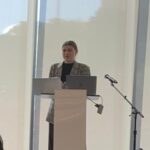
Major: International Studies, Spanish
Project: “Pachuquismo and Constructed National Identity in the U.S. and Mexico in the 1940s”
Pachuquismo was a counterculture born in the barrios of East L.A. in the 1940s. Mexican-American youth created their own social group defined by specific clothing, music fusions, and linguistic dialects. However, on both sides of the U.S. and Mexican border, pachucos had a poor reputation. In the U.S., mainstream media portrayed pachucos as juvenile delinquents and domestic threats. In Mexico, pachucos were mimicked and heavily criticized for their Americanization. In this essay, I identify how U.S. and Mexican mainstream media reacted to pachucos, and what those portrayals can tell us about the imagined national identities in both countries. I am centering my studies around three main research questions: (1) How did U.S. mainstream media portray pachucos, and what can that tell us about the imagined “American” national identity in the 1940s? (2) How did the Mexican film industry portray pachucos, and what can that tell us about the imagined “Mexican” national identity in the 1940s? (3) How do pachucos portray themselves through their music? To answer those questions, I look at three media sources from the 1940s to analyze the ways pachucos were criminalized, rejected, and celebrated: a Disney cartoon, a Mexican comedy movie, and a music album compiled by pachuco musicians from Los Angeles. Taken together, these sources demonstrate that the U.S. and Mexico were creating imagined national identities that were in direct opposition to each other, and excluded pachucos for their fusion and hybridity. I argue that contrary to the messages in mainstream media, pachucos were not purely rebels without a cause. Pachucos had agency: they asserted their belonging and cleared space for future generations of Mexican Americans.Gabby Whitehurst
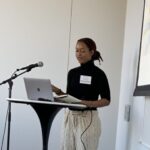
Major: Religious Studies, American Studies
Project: “Healing Separation in Schools”
How can we reimagine American K-12 education as a restorative and healing space for Black students? This interdisciplinary project is rooted empirically in the fields of education and American Studies, but will be using methods found not only in those fields, but centrally in religious studies, sociology and anthropology. This project looks at the American school system as an apparatus of capitalism from its conception. Much like other institutions of capitalism, the school system works through punitive conditioning to create separation between students, teachers, and their classroom community. This conditioning also includes a separation between actions and consequences that can tear away at students’ sense of self and belonging. I want to focus on education specifically for Black students and Black communities because throughout United States history, literacy and other forms of education were criminalized for Black people, who, since slavery, have found insurgent ways to communicate and educate. Even after slavery, Black history has been considered subversive to teach, and insurgent education, or “fugitive pedagogy” continues to this day. This history is often not considered in the classroom when thinking about what accommodations and safe space for students look like. This summer I worked with Breakthrough Twin Cities as a 9th grade literature teacher. Part of the teaching model that is one of the reasons I chose to work with Breakthrough is that they claimed to work from a restorative justice framework. One main question that I reflect on is how can educators create healing communities in schools in an increasingly policed environment? Looking back to insurgent Black means of education like oral histories, storytelling, learning through music and dance, and even the creation of secret or discreet spaces of learning, can help guide practices that, in addition to restorative practices, can aid in Black education. -
Class of 2022 Zoe Allen
Major: American Studies
Tonantzin Cabrera
Major: Sociology
Marc Mutk

Major: English and Political Science
Ayize James

Major: Environmental Studies
Diana Her

Major: Asian Studies
-
Class of 2021 Maria Arreola

Hometown: Blue Island, IL
Majors: Political Science, Spanish, and SociologyTitle: The History of Sanctuary Churches and The Representations of Migrants
Project: While the work of immigrant rights organizations is often underreported, the involvement of places of worship in the current New Sanctuary Movement (and in the US Immigrant Rights Movement in general) tends to be completely overlooked. Recently sanctuary congregations have received greater media attention and yet these congregations are nothing new. The New Sanctuary Movement (NSM) of today, for example, is influenced by its predecessor, the Sanctuary Movement (SM) and has both a historical and theological basis. A better understanding of the historical trajectory from the SM to the NSM and how churches have framed their own involvement through the trajectory of these ideas helps us understand the way undocumented individuals have been perceived. Ultimately, this research points to the limits of and tries to decenter the frameworks imposed by movement institutions and tries to examine the ways migrants frame themselves. In relation to this possibility, I will address issues of self-representation, ally-ship and advocacy.
Wanda Barradas

Hometown: Chicago, IL
Majors: Political Science and SociologyProject: Ethnographies on undocumented students mainly focus on the negative impacts that undocumentation has. The common narrative is that legality negatively impacts children as they grow up and encounter their status as a barrier to live freely. Undocumented women, specifically, continue to play a central role in maintaining community, taking an emotional toll in their families and schools. However, newer generations have used their status as empowerment to climb the social hierarchy and pursue a career. Undocumented students are no longer hiding in the shadows. My research focuses on how undocumented immigrants take advantage of their status to empower themselves to go into a system where they feel like they do not belong.
How does documentation impact the way undocumented students make decisions and understand their own lives academically, socially, and emotionally? How do undocumented women navigate higher academia despite their responsibilities with their families? Despite the harsh circumstances undocumented students face, how do they use their status and their migration story as motivation to succeed?
Through a form of feminist auto-ethnography, I hope to not only help make higher education navigable for more undocumented students but also to shed light on the resources necessary to support them.
Janett Casillas

Hometown: Houston, TX
Majors: Anthropology and GeographyTitle: Rethinking Development: A Case Study of Mano a Mano
Project: Since the Cold War Period, “development” has become a multi-billion-dollar industry. Thousands of interventions have been carried out in the name of development, often with ulterior political purposes, that have left millions of people around the world in worse conditions than before. Within anthropology, two critiques of development have emerged. Some criticize it on the basis that it imposes a teleological path with European standards as the end goal upon people throughout the world regardless of their unique social, political, and economic contexts. This view holds that development practice and integration into the capitalist world-market will lead to further worsening of living conditions. On the other hand, there are those who believe that these interventions are simply misguided with the help of scholarly oversight, by one familiar with the social, political, and economic contexts of the “community,” NGO’s could effect successful development and lead to a genuine improvement in people’s lives. This work looks at Mano a Mano, a development NGO that works with rural Bolivian communities to build clinics, schools, roads, and agricultural projects. Founded by a Bolivian man who is from a village like the ones the organization works, this organization works in partnership with the people through a unique community-based model. Through an institutional ethnography, this project will assess the viability of Mana a Mano as a model for successful development.
Victoria-Jo Gapuz

Hometown: Plainfield, IL
Major: Sociology and Educational Studies, International Development ConcentrationTitle: Pinay Identity Construction: Colonialism to Empowerment
Project: With over 300 years of Spanish colonization followed by US occupation after the Spanish-American War, the ramifications of colonialism has had lasting effects on the Filipinx identity. Whether it be living in the Philippines, the United States, or somewhere among the diaspora, Filipinxs face an internal conflict in understanding the fragments of their ancestry within different contexts. As a result, I am drawn to study what identity construction looks like for Filipinx-identifying womxn in the United States. By using colonialism as a framework, I hope to understand its role in fragmenting both the Filipinx and the woman. However, my research will use colonialism as a way to understand historical context and then apply it to how present-day womxn reclaim their narratives and move through the world. Through a series of ethnographic interviews, I will begin my research by interviewing Filipinx domestic caregivers.
Although the focus of my research is on Filipinas, the purpose behind it is to uplift the Filipinx community as a whole. The issues that affect Pinays are community issues. It is important that my work critically engages with the intersecting identities that Filipina womxn hold so that Pinays and their stories are humanized. Through analyzing the effects of internalized colonization, I hope to better understand how Pinays cope and reconstruct who they are. Ultimately, I am drawn to study Pinay identity construction because at the intersection of colonization, Filipino struggle, and empowerment, Filipina womxn are finally seen and heard.
Gabi Estrada
Hometown: Northfield, MN
Major: Sociology -
Class of 2020 Gianna Brassil
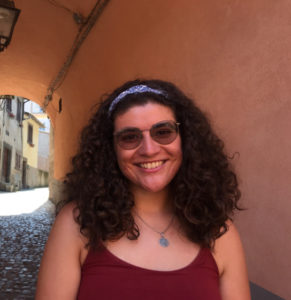
Hometown: San Francisco, CA
Majors: Anthropology and Religious StudiesTitle: Situating Corporeal Knowledge, Time, and the Immanent Divine: St. Mary of Egypt and Sha’wana
Project: For my Mellon Mays project, I will synthesize my interests in early Islamic mystical thought with key anthropological texts that develop understandings of self-cultivation through ritual, practice, and discipline. Specifically, I plan on focusing on the figure of Qushayri (d. 1074), his treatise, Al-Risāla al-Qushayriyya, and his Quranic commentary, Laṭāʾif al-ishārāt. Qushayri’s body of work engages with how one reflects on and realizes God’s immanent presence through corporeal forms of knowledge, perception, and time. I am interested in how his texts, in addition to the Quran and Hadith, stress the importance of the sensory body throughout the development of a mystical ascetic knowledge. This project will engage with the field of Islamic virtue ethics, moral self-creation and disciplining. I plan on incorporating my readings of key texts in the anthropology of Islam (Mahmood, Hirschkind, Mittermaier) and asking to what extent can we trace a unified vocabulary between Qushayri’s treatise and the interlocutors in ethnographies of contemporary practices within the Islamic Revival? This inquiry will demonstrate how “Muslim moral lives are incoherent, ambivalent, and fragmented” (Schielke), and anthropological projects devoted to complicating the lived realities of spiritual self-cultivation deepen the possibilities and while also grouding the limitations of Qushayri’s work.
Ikran Sheikh-Mursal
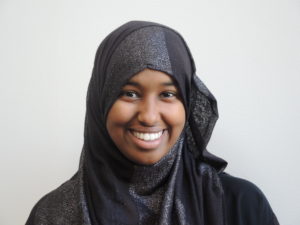
Hometown: Shakopee, MN
Majors: International Studies and ClassicsTitle: Boycotts and Resistance: Vaccine Opposition in Contemporary Polio-Endemic Countries
Project: Polio, an infectious disease, has been at the forefront of the World Health Organization’s (WHO) disease eradication agenda since its creation. The three current endemic countries– Nigeria, Pakistan, and Afghanistan- continue to face barriers that prevent polio eradication. As public health organizations draw closer to polio eradication, these countries continue to face political and historical challenges to eradicating the disease.
Deleted: This paper discusses historical and contemporary resistant practices, specifically opposing the polio vaccine, in the three endemic countries. Polio eradication has been a global public health goal for decades, thus, I explore the causes that make polio a difficult disease to eradicate. My project focuses on three main questions: How are the legacies of colonialism present in the remaining polio-endemic countries? How have extremists groups within the three countries limited and/or banned the polio vaccine, and how does this affect global polio eradication goals? My projects also grapple with the complexities of eradication in these regions experiencing conflict and discusses the importance of why polio eradication matters.Maya Varma
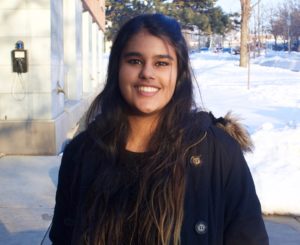
Hometown: Los Altos, CA
Majors: Educational Studies and Art HistoryTitle: Recovering The Invisible Histories of Female Trauma: Nalini Malani’s Resistance Against State Narratives in Post-Partition India
Project: Within the political, religious, and ideological restructuring following the 1947 partition of British India, both India and Pakistan experienced national trauma on an unprecedented scale. Mass violence and chaos pervaded both countries, leaving millions displaced, and this violence has continued to materialize in postcolonial spaces of religious and political conflict. Women in particular have experienced an incomprehensible level of assault, mutilation, and oppression. In this paper, I examine the lasting effects of partition violence on women living in post-partition India and consider the role of postcolonial Hindu nationalism in producing gendered communal violence. Focusing on feminist visual languages, I closely analyze select works from Nalini Malani, a contemporary Indian artist who visually critiques dominant state narratives that simultaneously perpetuate and silence these subaltern histories of violence. Through videos, installations, and large-scale drawings, Malani utilizes mythical female protagonists, namely the Greek heroine Medea and the Hindu Goddess Sita, to visually comprehend national trauma. In intertwining multiple mythologies to construct transnational narratives of postcolonial feminist liberation, Malani resists the monolithic fundamentalist movements proliferating post-partition India and provides a radical space of visibility and healing for these silenced women. -
Class of 2019 Luz Ramirez Cruz

Hometown: Escondido, CA
Major: American StudiesProject: The saying goes “you are what you eat,” but then what happens when communities don’t have access to ingredients and foods that are staples of their cultural identities? My project will examine the role that food plays in maintaining cultural identity among Latin American immigrant communities in the Twin Cities and, on a larger scale, how the types of food one has access to impact cultural assimilation. In order to begin my investigations I will first try to understand the history of Latin Americans in the Twin Cities. By looking at how and when the population began to grow in Minnesota through the decades, and looking at nationalities, I can begin to understand the motivations behind their migration and how they’ve taken steps to recreate comforts from home here in the US, with specific attention to food. Geographical access to culturally specific stores and when they began to appear in the Twin Cities is another aspect of this project that will be instrumental in obtaining answers. With this context I can then begin to ask larger questions of assimilation and food justice as they relate not only to immigrant communities, but the generations that follow them.
Bianca Gonzalez

Hometown: Los Angeles, CA
Major: Media and Cultural StudiesProject: My project will analyze the representations of north Minneapolis in commercial media in the context of literature on global cities and population movement. The narratives of north Minneapolis are predominantly ones of crime and crisis. However, there are community members and organizations that are working to revitalize the area. The application of Edward Said’s thought will explain why those efforts to revitalize the community do not have a place in commercial media. I will continue my analysis with these questions in mind: what material effects do these narratives have on the community? How do these media representations affect population movement and the allocation of economic resources? I hope to contribute an interdisciplinary perspective which centers around how representations of north Minneapolis mediate the way people experience the community and how that mediated experience creates real effects on the community.
Samantha Manz

Hometown: Lubbock, TX
Major: History and LiteratureProject: Gendered violence fits into the landscape of settler colonialism, borderland theory, and racial hierarchical structures that are imposed upon women of color. I research how Indigenous women experience sexual violence in a historical and contemporary context. I utilize precolonial maps, treaties, and ideas of sovereignty to mark the physical land dispossession/exploitation of Indigenous nations, as well as the exploitation of Indigenous women. However, my project is a two-fold project. In entirety the goals of this project are to present existing structures of settler colonialism, as well as demonstrating how Indigenous women artists are responding and refusing these narratives of settler colonialism. The examination of selected artists and their respective work will demonstrate how Indigenous women use art as a form of resistance and a form of refusal by reclaiming traditional methods and space. By interviewing Indigenous female artists, I explore how they revitalize and produce cultural traditions that refuse to perpetuate settler colonialism. I analyze why these artists use specific forms and how their art infuses elements and layers of indigeneity.
Makaya Kekoa Resner

Hometown: Missoula, MT
Major: International StudiesProject: The international indigenous peoples movement is one of the most recent phenomenons to come out of the United Nations Human Rights Council and it has achieved more than ever expected in the last few decades. However, progress should not stop with the ratification of the Declaration on the Rights of Indigenous People, especially since many of the largest world powers have not signed on. My studies look at the origins of this movement and the necessity to preserve indigenous cultures, the movement’s relations with nation-states and sovereignty as an ideology, and consider revisions that are more inclusive to “mixed” indigenous identities. Mixed race is one of the fastest growing identities globally but scholarship still lacks analysis of how these individuals fit within a group, let alone an international movement. Therefore, the big question asks, what does it take to make international movements integrate multiple identities for the sake of human rights? Many of the obstacles toward reconciliation of indigenous rights occur because states still do not recognize the complexity that many indigenous peoples live with. However, with support from political and identity theory, I strive to incorporate the duality of identities within the international indigenous peoples movement and revise definitions of indigenousness in literature and law.
-
Class of 2018 Malik Earle

Hometown: Hancock, NH
Major: Religious StudiesTitle: Gaming the System: Critical Essays on Videogames
Project: This project prioritizes a critical analysis of videogames. With a focus on popular current-generation Role-Playing Games (RPGs), I explore how complex cultural projects are recreated and extended or reimagined in these game-worlds. How do videogames represent and participate in conversations on religion, race, gender, and colonialism? Can videogames simulate some form of “activism” in their confined game-worlds? What are the models of resistance and oppression presented by different videogames? Through this study I hope to contribute to the critical study of videogames and improve my understanding of the limits and possibilities of videogame design, gameplay, and discourse.Andrea Kvietok

Hometown: Lima, Peru
Major: AnthropologyTitle: The Women (and Men) that Return to Africa: Feminizing Return Migration and Voluntary Reintegration Experiences amongst Senegalese migrants
Project: When individuals, institutions, and governments talk and think about migration, very rarely do they bring up the topic of return. However, many, if not all, migrants express the desire to return to their ‘homes’ eventually, rather than permanently relocating within the receiving communities. My project puts in conversation the study of voluntary return migration and reintegration experiences amongst Senegalese migrants with transnational mobility, gender, and world systems theory studies. Through a review of relevant literature, document analysis, and ethnographic interviewing with returning Senegalese migrants, who’ve returned from West and Central African countries, European countries, and the U.S., and non-governmental organizations working in the field of migration in Dakar, Senegal, my research studies the structural, social, and individual reasons for migrating, their experiences abroad, and the individual and community-based implications of their return. This project uses examples of transnational mobility to complicate socially-constructed notions of ‘’home’’ and ‘’gender’’ in receiving and sending communities for Senegalese migrants. Above all, my project is built on the concept of the dangers of a single story, crafted by Chimamanda Ngozi Adichie, and places the voices of migrants themselves at the frontline of this research to combat the stereotypes and monolithic foundations that are still prevalent within the study of migration.Ayaan Natala
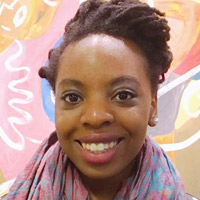
Hometown:St. Paul, MN
Major: American StudiesProject: My project argues that extrajudicial killings, gratuitous violence, and the legacy of slavery coupled with legalized discrimination against Black citizens is a human rights violation because it undermines their right to life, liberty, and security of persons. Opel Tometi, co-founder of Black Lives Matter (BLM), clarified BLM is not a civil rights movement that focuses on policy reform, but a movement that fights “for the human rights and dignity of black people in the U.S., which is tied to black people’s struggle for human rights across the globe” (Time). In 2016, BLM is internationally recognized as a human rights project, but domestically portrayed as either too radical from the far left or a terrorist group from the far right. This project wrestles with the question, “How is BLM learning from previous Black freedom struggle movements to move beyond the conversation of civil rights to human rights as a way to create a contemporary panafrican human rights movement?”
Jordana Palmer

Hometown: Kingston, Jamaica
Majors: Sociology and Political ScienceProject: My project examines variation in electoral violence across countries. Works on nationalism and ethnic violence indicates that although nationalism temporarily unified people to achieve the common goal of independence, it did not erase class or ethnic differences and grievances in the post-colonial era. The rise of nationalism strongly affected the character of group struggles for recognition which became contentious during elections. Hence, politically salient divisions persist within countries, which in turn transform identities into points of open conflict during elections. Therefore, I advance the principal hypothesis that the higher degree of ethnic salience the higher the risk of electoral violence. At the same time, results support a second hypothesis: Economic inequalities based on ethnic divisions also correlate with a higher risk of electoral violence. In this sense, land distribution is often a key factor for these inequalities. Primarily, this study looks to answer the question “why do some countries’ populations protest elections more than others?”
